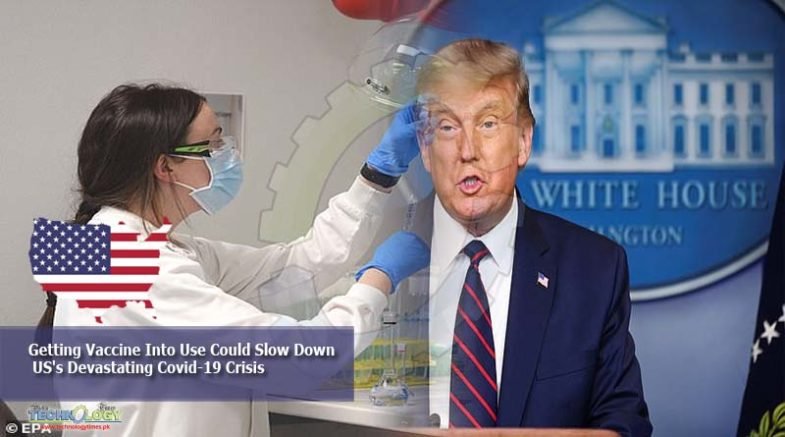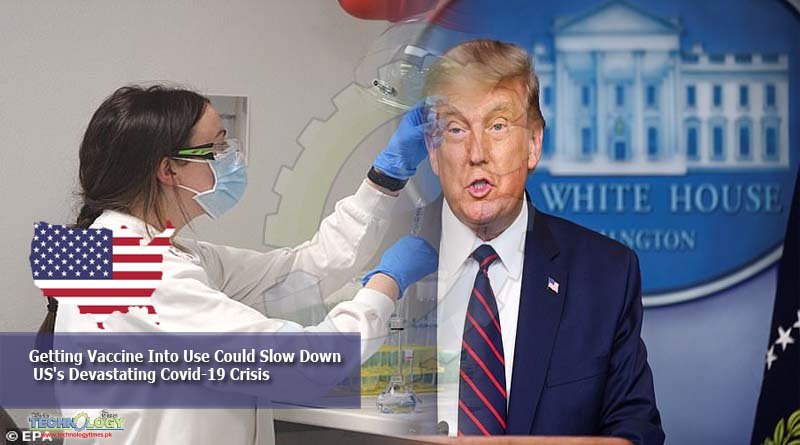Pharmaceutical giant AstraZeneca has dismissed claims its experimental Covid-19 crisis and its vaccine could be fast-tracked in the US amid reports Donald Trump wants to get it approved before the presidential election this autumn.

White House insiders claim the US President is considering speeding up regulatory approval for the jab, originally developed by Oxford University scientists.
Getting a vaccine into use and slowing down the US’s devastating coronavirus crisis — the worst in the world — could boost Trump’s chances of becoming re-elected in November, when he runs against Democratic candidate Joe Biden, who accused him of having ‘failed to protect us’.
But AstraZeneca, which oversees manufacturing and distribution of the jab, said it has not entered any talks about getting it an emergency use authorisation in the US. It added that it would be ‘premature to speculate on that possibility’.
It comes after Number 10 yesterday insisted Britain will be the first to get the Covid-19 vaccine, if it is proven to work. The UK has already bought 100million doses of the jab, while the US has ordered 300million.
Early trials have shown promising results, with tests showing the vaccine is safe to use in humans and appears to provoke an immune response. But data that proves it protects people is not expected until later this year.
The only country in the world to have approved a vaccine against Covid-19 so far is Russia. But it came under fire for doing so without proper clinical trials.
Risks of using jabs that have not been tested thoroughly include damaging side effects or administering one that doesn’t really work. If something goes wrong with an official vaccine, it could further dent already-fragile public faith in vaccinations.
AstraZeneca, which claims it can manufacture 2billion doses and already operates several facilities in America, denied that it has had discussions with the US about an early deal.
A spokesperson for the Brentford-based firm said: ‘AstraZeneca has not discussed emergency use authorization with the US government and it would be premature to speculate on that possibility.
‘Late stage Phase II/III trials for AZD1222 are ongoing in the UK and other markets globally, and we do not anticipate efficacy results until later this year.’
The team have genetically engineered a virus to look like the coronavirus — to have the same spike proteins on the outside — but be unable to cause any infection inside a person.
This virus, weakened by genetic engineering, is a type of virus called an adenovirus, the same as those which cause common colds, that has been taken from chimpanzees.
The UK Government is not expected to start using the jab until large trials have proved it is safe.
Professor Chris Whitty, England’s chief medical officer, said on Saturday it would be ‘foolish’ to assume a vaccine would be ready before 2021.
Professor Whitty said: ‘I would obviously be delighted if it came earlier rather than later but I’d be quite surprised if we had a highly effective vaccine ready for mass use in a large percentage of the population before the end of winter, certainly before this side of Christmas.
‘Now that may be wrong, a lot of people are doing a huge amount scientifically, logistically to make sure that’s a pessimistic statement, to try and see if we can get a vaccine at extraordinarily fast speed but we have to check it works and we have to make sure it’s safe and these things do take time.
‘So I think if we look forward a year I think the chances are much greater than if we look forward six months and we need to have that sort of timescale in mind.’
It comes as the World Health Organization’s (WHO) director general said a globally coordinated roll-out of a coronavirus vaccine will be in the ‘interests of all countries’.
Dr Tedros Adhanom Ghebreyesus warned against ‘vaccine nationalism’ and said competition may lead to prices spiking exponentially, which would only prolong the virus.
Instead, he urged countries to support the Covax vaccines facility, which has the ‘largest and most diverse’ Covid-19 vaccine portfolio in the world.
He told a WHO press briefing that 172 countries were ‘engaging’ with the mechanism, which aims to deliver at least two billion vaccine doses by the end of 2021.
Dr Tedros said: ‘We’re working with vaccine manufacturers to provide all countries that join the effort timely and equitable access to all vaccines, licensed and approved.
‘This doesn’t just pool risk, it also means that prices will be kept as low as possible.
‘New research outlines that global competition for vaccine doses could lead to prices spiking exponentially in comparison to collaborative efforts, such as the Covax facility.
‘It would also lead to a prolonged pandemic as only a small number of countries would get most of the supply. Vaccine nationalism only helps the virus.’
Nine vaccines are currently part of the Covax portfolio, while discussions were ongoing with four other producers, Dr Tedros said.
Fury erupted today over the controversial decision by the US to approve treating Covid-19 patients using the blood of coronavirus survivors.
Top scientists warned there is no proof the century-old treatment works, despite several studies offering promising results.
The Food and Drug Administration last night gave doctors emergency authorisation to use convalescent plasma, saying the ‘known and potential benefits of the product outweigh the known and potential risks of the product’.
Donald Trump called it a ‘very big day’ at a White House briefing yesterday, adding that the approval was a ‘truly historic’ moment. The US President also claimed that the treatment was proven to reduce the chance of death from coronavirus by more than one third.
But scientists criticised US officials for making the ‘bad conclusion’ because the therapy has not been put through the most rigorous human trials, meaning there is no conclusive proof that the treatment works.
One expert, however, called it ‘good news’ and said he hopes the UK can soon begin to use convalescent plasma routinely.
British researchers leading a major trial into promising therapies — which found that dexamethasone can cut the risk of death in critically-ill coronavirus patients — said the move was ‘ripping up good science that protects patients’.
The FDA said more than 70,000 patients had already been treated with convalescent plasma, which sees infected patients given the antibody-rich blood of survivors in an attempt to boost their immune response and fight the disease.
It comes just days after top US experts, namely Dr Anthony Fauci and Dr Francis Collins, reportedly stepped in to pause the authorisation of convalescent plasma because the evidence was not strong enough to do so.
Trump lashed out at the FDA at the weekend and accused the agency of attempting to delay the approval of Covid-19 therapeutics until after the president election in November.
The new FDA authorisation means those who had coronavirus and recovered can now donate their blood to be used as a treatment for those currently suffering from the disease.
The FDA approves emergency use authorisations during public health emergencies to speed along unapproved therapeutics to treat or prevent serious diseases where there are no other adequate and available alternatives.
For instance, on May 1, the FDA authorised the emergency use of Gilead Science’s experimental antiviral remdesivir to treat patients.
‘Today I’m pleased to make a truly historic announcement in our battle against the China virus that will save countless lives,’ Trump said last night as he was flanked by Secretary of Health and Human Services Alex Azar and FDA Commissioner Stephen Hahn.
The president also claimed the treatment has proven to reduce the chance of death from coronavirus by more than one third.
Mr Azar said: ‘I just want to emphasise this point because I don’t want you to gloss over this number. We dream in drug development of something like a 35 per cent mortality reduction.’
‘This is a major advance in the treatment of patients. This is a major advance.’
Trump claimed that over 100,000 Americans have already enrolled to receive this treatment.
‘Based on the science and the data, the FDA has made the independent determination that the treatment is safe and very effective,’ Trump assured.
He highlighted that he was not the one pushing for the approval.
Mayo Clinic researchers revealed findings last week that suggested convalescent plasma could improve survival odds for Covid-19 patients.
The study assessed 35,000 patients given convalescent plasma, including a high number who were critically ill.
But the study compared patients who had received the treatment with each other. It looked at mortality rates between patients given high or low doses of antibodies, and between those treated early and later.
This is different to a randomised placebo controlled study — when an experimental drug or therapy is compared with a placebo or alternative medicine to see if it truly offers better survival rates.
Randomised trials are deemed the gold standard for testing if a therapy truly works because they eliminate any bias.
The findings were published on a pre-print server, MedRxiv, on August 12. Because they are not in a medical journal, they have not been scrutinised by other scientists yet, which helps to flag flaws.
The findings show 8.7 per cent of patients treated with convalescent plasma within three days of diagnosis died after seven days, compared to about 12 per cent of patients who were treated four days or more after their diagnosis — a statistical difference of around 37 per cent.
Those treated with plasma containing the highest levels of antibodies had a 35 per cent lower risk of dying within a week compared to those treated with less-rich plasma.
Dr Eric Feigl-Ding, an epidemiologist from Harvard, pointed out the 35 per cent reduction in mortality was not between the experiment group and control group.
Reacting to the news of the FDA’s authorisation on Twitter, he said: ‘What the hell. This is a bad convalescent plasma conclusion — it was not a randomized trial. Trump doesn’t care, but FDA head should know better!’
There are two randomised control trials of convalescent plasma therapy ongoing in the UK — the REMAP-CAP trial is seeing if it will help patients in intensive care, while the RECOVERY trial is looking at hospitalised patients.
Martin Landray, a professor of medicine and epidemiology at the University of Oxford, who is leading the RECOVERY trial, did not welcome the FDA’s authorisation.
He wrote on Twitter: ‘Convalescent plasma for COVID-19. It may work. We hope it will work. But nobody knows if it does. That’s why we are studying it in the #RECOVERYtrial. Then we’ll know & wont have to guess.’
Another RECOVERY trial lead, Peter Horby, professor of emerging infectious diseases at Oxford, said: ‘Allowing widespread use of unproven treatments creates confusion and undermines chances of improving care through proper science.
‘This is not “cutting red tape” it’s ripping up good science that protects patients.’
But Professor Lawrence Young, a virologist from University of Warwick, was pleased with the developments.
He told MailOnline: ‘The FDA emergency use authorisation for convalescent plasma to treat Covid-19 is great news.
‘I’ve been a strong advocate for this approach since the beginning of the outbreak and, with other colleagues, petitioned the government to investigate its use.
‘Convalescent plasma therapy has been used to the prevention and treatment of many infectious diseases for more than a century. Over the past 20 years this approach has been successfully used in the treatment of SARS, MERS and 2009 H1N1 pandemic flu with good safety profile and efficacy.
‘I hope the UK trial reports soon and we can begin using convalescent plasma routinely to treat patients with Covid-19.’
Originally published at dailymail
